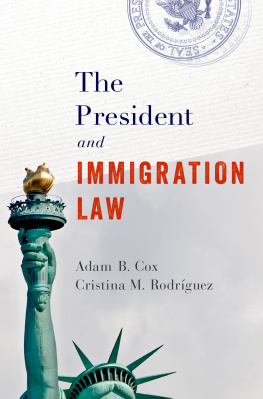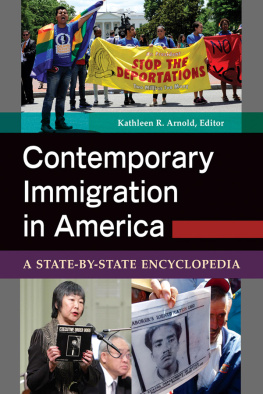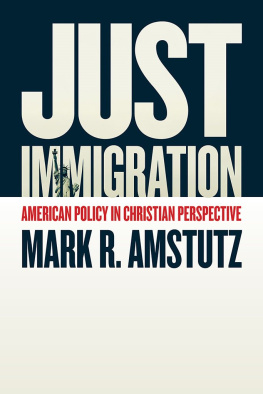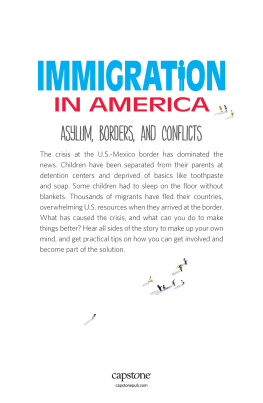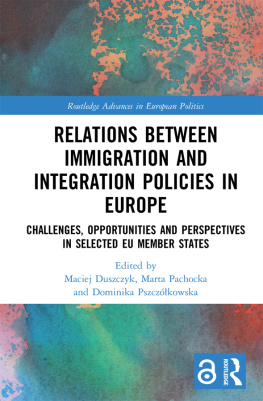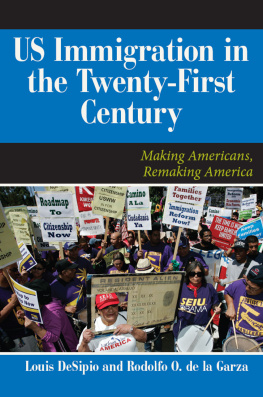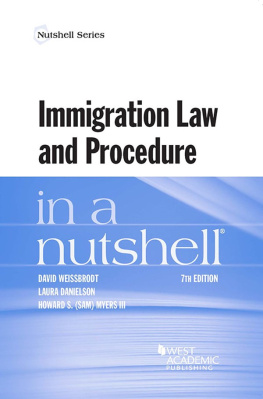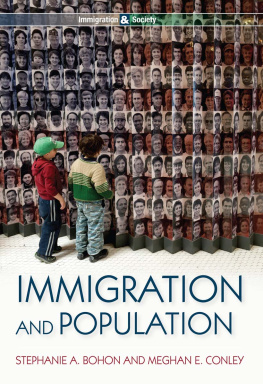Acknowledgments
The origin of this book dates back to 2004although I was not aware of it at the timewhen I boarded a plane for Pittsburgh to become the first research fellow at the Ford Institute at the University of Pittsburgh. At that time my immediate concerns were to be allowed to travel with my cat, Lola, in cabin, to find a place to live, and to finish preparing my courses for the semester. I did actually find a house (I even married its owner), I enjoyed teaching again in the United States, and I spent a fortune on air tickets for Lola as the initial trip turned into a long journey leading to a new lifeand this book. I completed it the day Osama bin Laden was killed. Given the mission and the structure of al-Qaeda, I suspect that he will loom as large a symbolic figure in death as he did alive.
When I started this project, there was already a vast literature on immigration issues, as well as on the impact of 9/11 and the subsequent development of counterterrorist legislation. However, most studies either focused on some particular aspects of immigration policies or addressed security issues as mostly unrelated to a more global context. They provided useful but patchy insights, instead of exploring why and how immigration policies were becoming more intrinsically linked to patterns of democratic development and the enhancement of security. My conviction was that the critical linkage between these dimensions was both a source of, and symptomatic of, some of the most salient and urgent problems facing both Europe and the United States today. This book is thus comprehensive in character. It is intended to provide a systematic and critical evaluation of the immigration-security nexus. That nexus is defined as the implementation of restrictive immigration measures intended to fight terrorism, while counterterrorism is used as a way to manage migration flows and control minorities. My goal is to show how and why the excesses of securitization have been detrimental to both migrants and immigration policies, generating in turn further insecurity both in the United States and in Europe.
I believe that a transatlantic comparison is crucial for at least two reasons. First, the United States and European countries face similar immigration and security challenges, and they have implemented policies that share common features, such as the emphasis on border controls, the framing of immigration as a terrorist issue (even before 9/11), and the reappraisal of state sovereignty to the detriment of civil liberties and human rights. Second, they all have to deal with the controversial and mostly unexpected outcomes of securitization, such as increasing illegal immigration and homegrown terrorism. On both continents, I argue, the search for greater security has both created more insecurity and degraded democracy, as surveillance, profiling, rendition, and the use of military courts have enhanced the prospects for the recruitment of a generation of domestically born terrorists.
I am very grateful for the financial and logistic support provided by the following institutions: the Ford Foundation; the Carnegie Corporation of New York; the Graduate School of Public and International Affairs and the European Union Center of Excellence at Pittsburgh University (where I was located in 2006 as a Fulbright Transatlantic Fellow); the Department of Political Science and the Graduate School at Northwestern University (where I was the Roberta Buffet Visiting Chaired Professor in 2005); and the CEVIPOF at Sciences-Po (Paris).
I would like to acknowledge the useful comments I received from workshop participants at Johns Hopkins University, New York University, Harvard University, Northwestern University, Princeton University, the University of Pittsburgh, Boston University, the University of Warwick, Florida International University, Sciences-Po (Paris), the European University Institute, and at meetings of the American Political Science Association, the International Studies Association, and the Council of European Studies.
I also very much benefited from the expertise of individuals who participated in the ISI Immigration Research Network that I co-directed with Simon Reich: Ilya Prizel, Didier Bigo, H. Richard Friman, Francisco Javier Moreno Fuentes, Patrick Ireland, John Tirman, Zsolt Nyiri, Lynnelyn D. Long, Carol Bohmer, Jan Willem Duyvendak, Frank D. Bean, and Susan K. Brown.
I wish to extend my deepest gratitude to friends and colleagues who provided me intellectual and moral support: Vivien Schmidt, Jolyon Howorth, Wendy Kates, Martin Schain, Michael Hanchard, Michael Loriaux, William Keller, Louis W. Pauly, Patrick Le Gals, Elspeth Guild, Kate Rothko, and Richard Ned Lebow. They all have made my work and my life in the United States much easier. I am also much grateful to my colleagues from the School of Public Affairs and Administration and the Division of Global Affairs at Rutgers University, who facilitated my migration to New Jersey.
I would also like to thank my students on both sides of the Atlantic, who forced me to focus on key questionsand sometimes to provide answers. I discussed with them most of the issues addressed in this book, and their reactions encouraged me to complete this work.
Comments and criticisms from two anonymous reviewers helped me to revise the earliest version of the manuscript, for which I am grateful. Herman Schwartz, with the approval of Peter Andreas, rightly believed that the initial proposed title sounded like a boring shopping list and suggested the current one. At Cornell University Press, Roger M. Haydon was exceptionally supportive. I gave him many reasons to run away (such as a first draft of five hundred pages, single spaced), but he never departed from his (British) poise in the face of my (French) transgressions. I could not have written this book without his guidance, incisive criticisms, and resilient confidence.
Over the years, I have been fortunate to have friends and relatives who helped me to get through lifes painful events while sharing my happiness in the brightest moments. I am especially grateful to Julie, Lorne, Marc, Isabelle, Charles, Yacine (who left the boys band too soon), and Simon Reich, my loving husband and best friend. This book is dedicated to him with my love and greatest admiration. Because he had faith in my ability to write this book, I did itthanks to his intellectual support and his affection. Because he has a unique talent for combining high moral standards and joie de vivre, I feel lucky to owe him so much.
We are both immigrants, and children and grandchildren of immigrants. Like our ancestors, we had to adapt to a new country and to adjust to a new way of life. Unlike them, we did it by choice. In memory of them, we appreciate our fate.
ARIANE CHEBEL DAPPOLLONIA


